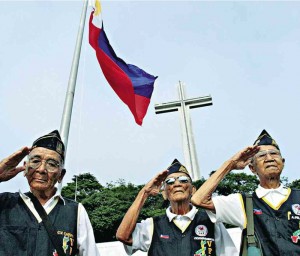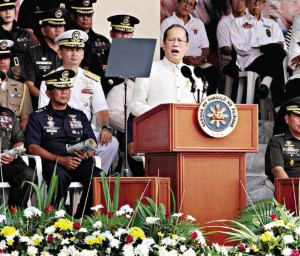Aquino vows to deliver full benefits to veterans

OLD SOLDIERS NEVER DIE, THEY JUST FADE AWAY Celestino Carpio, 89, Tomas Mendoza, 92, and Apolonio de la Cruz, 92—who fought Japanese forces in World War II—manage snappy salutes during the 71st Araw ng Kagitingan (Day of Valor) commemoration on Mount Samat in Pilar, Bataan, on Tuesday, April 9, 2013. GRIG C. MONTEGRANDE
Realizing that the annual ritual of wreath-laying and rhetorical speechmaking would never be enough, President Aquino on Tuesday pledged to fully deliver the benefits of the thousands of World War II veterans, even as he challenged contemporary Filipinos to emulate their selfless sacrifice.
“We know we can never match through lavish ceremonies or floral offerings the true worth of what our veterans did. This is why, as we recall the heroism of those who showed concern or continue to show concern for our country, we care for their well-being and that of their families,” Aquino said in a speech delivered in Filipino at commemorative rites at the Mt. Samat memorial in Bataan Monday.
A giant cross, the Dambana ng Kagitingan (Shrine of Valor) stands on the summit of Mt. Samat marking the scene of the fierce battle that preceded the surrender of Filipino and United States forces to the Japanese on April 9, 1942. The day is commemorated every year as Araw ng Kagitingan (Day of Valor) to pay tribute to the veterans of World War II.
Working really hard
Aquino said the government was working hard to deliver in full the administrative disability pension, a monthly P1,700 for veterans who have reached the age of 70, on top of the P5,000 monthly pension.
Article continues after this advertisementWhen a veteran reaches 70, he is deemed totally disabled, entitling him to such a pension, according to the law.
Article continues after this advertisementThe President said the government was also aggressively monitoring the implementation of the Filipino Veterans Equity Compensation Law, through which the United States has given, as of January 2013, $224 million worth of compensation to more than 18,700 applicants.
On top of this, 599 public hospitals accredited by the Veterans Memorial Medical Center continue to serve the veterans, with the subsidy for each patient increased to P1,200 per day, up from P800, since January, he said.
Under this law, non-US citizens get $9,000 and US citizens, $15,000.
Aquino said 599 public hospitals accredited by the Veterans Memorial Medical Center render medical services to retired or active soldiers.
“Here’s the good news. Since January, the subsidy for patients seeking medical care in public facilities has been increased from P800 to P1,200 a day,” he said.
All these were undertaken in recognition of the “selfless sacrifice” of the veterans, Aquino said.
Tribute to soldiers’ heroism
Aquino paid tribute anew to the heroism of the Filipino soldiers of World War II.
“On Bataan Day, once again, our nation gathers in this historic spot so that we may look back and pay tribute to the heroism of the Filipino and American veterans of World War II—soldiers who did not think twice about taking bullets for their country; soldiers who battled not just against their enemies, but against hunger, and the grueling challenges of war; valiant soldiers who managed to hold onto hope in the midst of danger and uncertainty. Back then, and to this day, the Shrine of Valor stands as a symbol—not just of the courage they displayed, but of the depth of their sacrifice made in the name of their country and their countrymen,” he said.
Aquino issued a challenge to the younger generation of Filipinos to show their readiness to offer themselves for the cause of widespread and worthy changes.

THE RITES OF REMEMBERING In his speech at Mount Samat, President Aquino says that no amount of floral offerings and lavish rituals can ever match the “true worth of what our veterans did.” GRIG C. MONTEGRANDE
“As the new generation of Filipinos, let us make a commitment: let us show that we are likewise ready to give more of ourselves to achieve meaningful change,” he said.
Three war protagonists
The President stood together at the shrine with the representatives from the two other protagonists of World War II—the US and Japan.
Aquino said the Philippines was heartened that countries that were once at war with each other are now allies in preserving peace, stability and prosperity.
“It pleases us to no end that nations that were once in conflict with each other are now allies in pursuing peace, stability and progress. Together with America and Japan, we have proven that the best defense against misunderstanding is close cooperation, exchange, and adherence and upholding of international law. Again, we thank these countries for standing alongside our government,” he said.
‘Heartfelt apologies’
Japanese Ambassador Toshinao Urabe expressed “heartfelt apologies and deep remorse” for the “inexplicable suffering” of Filipinos during the war, though he stopped short of acknowledging his country’s responsibility for these sufferings.
Urabe said Japan has learned its lessons from the war, and considered the United States a “trusted friend.”
“The United States is our closest ally. Japan, Philippines and the US are strengthening our alliance and deepening our collaboration in order to create a free and democratic environment in the region,” he said.
Urabe said it was the responsibility of the present generation and the succeeding ones to continue pursuing this path “by sharing fundamental values such as democracy, freedom, respect for human rights and rule of law.”
“We work together to find common ground. Peace and prosperity for all is what we seek,” he said.
Urabe and US Ambassador Harry Thomas reiterated their countries’ close alliance with the Philippines, and their commitment to “peace and prosperity” in the region.
The two diplomats vowed to deepen their countries’ collaboration with the Philippines to create a “free and democratic environment” in the Asia-Pacific.
Thomas said “the Philippines, US and Japan are now extremely close allies.” He said Americans were thankful that peace reigns in the three countries “as we move forward on the road to peace and prosperity.”
Speaking of the ties between the US and the Philippines, the US ambassador said that the friendship was “stronger, all forged through blood, sweat and partnership.”
Urabe and Thomas, however, made no reference to North Korea’s threats to launch missiles against the US that have sent jitters across the region.
Life-size sculptures
At the station, also known as Kilometer 102, where survivors of the Death March were loaded into box cars for their final destination of Camp O’Donnel in Capas, Tarlac, city officials unveiled eight life-size sculptures of Filipino, American and Japanese soldiers.
No member of the Usaffe (United States Army Forces in the Far East) came as all its members in San Fernando, Pampanga, have died.
Eight guerrillas from the Hukbo ng Bayan Laban sa Hapon (Hukbalahap) came but were too weak to share their war experience.
Retired US Army Col. Richard MacMahon, a Vietnam war veteran, came to represent veterans belonging to Company B of the 192nd Tank Battalion. Most members of this National Guard unit were from Maywood, Illinois.
The markers of Km 101 and Km 102 were built by the Filipino-American Memorial Endowment and Alberta Clayton, said MacMahon.
In Baguio City, about 20 war veterans gathered at the Baguio Veterans Park, where the names of soldiers who resisted Japanese occupation are listed, to commemorate Araw ng Kagitingan.
The surviving members of the 66th Infantry Battalion of Usaffe joined the event, among them Benguet war veterans David Lusnog, Esteban Esco, Reynaldo Gadgad, Santiago Pitas and Albert Bugtong.—With Vincent Cabreza, Inquirer Northern Luzon